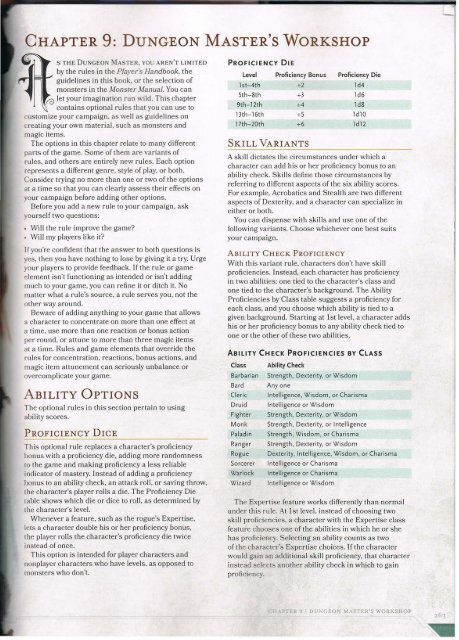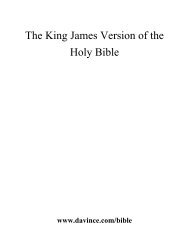Dungeon Master's Guide
You also want an ePaper? Increase the reach of your titles
YUMPU automatically turns print PDFs into web optimized ePapers that Google loves.
CHAPTER 9: DuNGEON MASTER's WoRKSHOP<br />
S THE D UNGEON M AS TER, YOU AREN'T LIMITED<br />
by the rules in the Player's Handbook , the<br />
guidelines in this book, or the selection of<br />
monsters in the Monster Manual. You can<br />
let your imagination run wild. This chapter<br />
contains optional rules that you can use to<br />
customize your campaign, as well as guidelines on<br />
creating your own material, such as monsters and<br />
magic items.<br />
The options in this chapter relate to many different<br />
parts of the game. Some of them are variants of<br />
rules, and others are entirely new rules. Each option<br />
represents a different genre, style of play, or both.<br />
Consider trying no more than one or two of the options<br />
at a time so that you can clearly assess their effects on<br />
your campaign before adding other options.<br />
Before you add a new rule to your campaign, ask<br />
yourself two questions:<br />
• Will the rule improve the game?<br />
• Will my players like it?<br />
If you're confident that the answer to both questions is<br />
yes, then you have nothing to lose by giving it a try. Urge<br />
your players to provide feedback. If the rule or game<br />
element isn't functioning as intended or isn't adding<br />
much to your game, you can refine it or ditch it. No<br />
matter what a rule's source, a rule serves you, not the<br />
other way around.<br />
Beware of adding anything to your game that allows<br />
a character to concentrate on more than one effect at<br />
a time, use more than one reaction or bonus action<br />
per round, or attune to more than three magic items<br />
at a time. Rules and game elements that override the<br />
rules for concentration, reactions, bonus actions, and<br />
magic item attunement can seriously unbalance or<br />
overcomplicate your game.<br />
ABILITY OPTIONS<br />
The optional rules in this section pertain to using<br />
ability scores.<br />
PROFICIENCY DICE<br />
------------------<br />
This optional rule replaces a character's proficiency<br />
bonus with a proficiency die, adding more randomness<br />
to the game and making proficiency a less reliable<br />
indicator of mastery. Instead of adding a proficiency<br />
bonus to an ability check, an attack roll, or saving throw,<br />
the character's player rolls a die. The Proficiency Die<br />
table shows which die or dice to roll, as determined by<br />
the character's level.<br />
Whenever a feature, such as the rogue's Expertise,<br />
lets a character double his or her proficiency bonus,<br />
the player rolls the character's proficiency die twice<br />
instead of once.<br />
This option is intended for player characters and<br />
non player characters who have levels, as opposed to<br />
monsters who don't.<br />
PROFICIENCY DIE<br />
Level Proficiency Bonus Proficiency Die<br />
1st-4th +2 1d4<br />
5th-8th +3 1d6<br />
9th-12th +4 1d8<br />
13th- 16th +5 1d10<br />
17th-20th +6 1d12<br />
SKILL VARIANTS<br />
A skill dictates the circumstances under which a<br />
character can add his or her proficiency bonus to an<br />
ability check. Skills define those circumstances by<br />
referring to different aspects of the six ability scores.<br />
For example, Acrobatics and Stealth are two different<br />
aspects of Dexterity, and a character can specialize in<br />
either or both.<br />
You can dispense with skills and use one of the<br />
following variants. Choose whichever one best suits<br />
your campaign.<br />
ABILITY CHECK PROFICIENCY<br />
With this variant rule, characters don't have skill<br />
proficiencies. Instead, each character has proficiency<br />
in two abilities: one tied to the character's class and<br />
one tied to the character's background. The Ability<br />
Proficiencies by Class table suggests a proficiency for<br />
each class, and you choose which ability is tied to a<br />
given background. Starting at 1st level, a character adds<br />
his or her proficiency bonus to any ability check tied to<br />
one or the other of these two abilities.<br />
ABILITY CHECK PROFICIENCIES BY CLASS<br />
Class<br />
Barbarian<br />
Bard<br />
Cleric<br />
Druid<br />
Fighter<br />
Monk<br />
Paladin<br />
Ranger<br />
Rogue<br />
Sorcerer<br />
Warlock<br />
Wizard<br />
Ability Check<br />
Strength, Dexterity, or Wisdom<br />
An y one<br />
Intelligence, Wisdom, or Charisma<br />
Intelligence or Wisdom<br />
Strength, Dexterity, or Wisdom<br />
Strength, Dexterity, or Intelligence<br />
Strength, Wisdom, or Charisma<br />
Strength, Dexterity, or Wisdom<br />
Dexterity, Intelligence, Wisdom, or Charis ma<br />
Intelligence or Charisma<br />
Intelligence or Charisma<br />
Intelligence or Wisdom<br />
The Expertise feature works differently than normal<br />
under this rule. At 1st level, instead of choosing two<br />
skill proficiencies, a character with the Expertise class<br />
feature chooses one of the abilities in which he or she<br />
has proficiency. Selecting an ability counts as two<br />
of the character's Expertise choices. If the character<br />
would gain an additional skill proficiency, that character<br />
instead selects another ability check in which to gain<br />
proficiency.<br />
H<br />
PTER 9 I DUNGEON MASTER'S WORKSHOP




